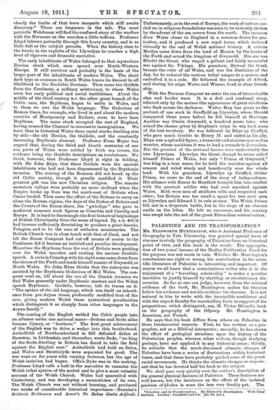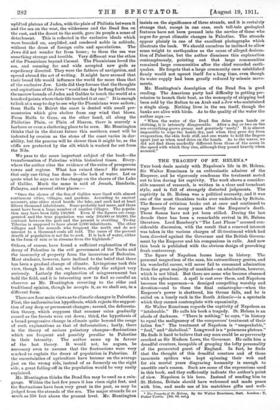PALESTINE AND ITS TRANSFORMATION.* Ma. ELLSWORTH HUNTINGTON, who is Assistant
Professor of Geography in Yale University, was granted special leave of absence to study the geography of Palestine from an historical point of view, and this book is the result. The appropria- tion of two years' income of the Hadley Publication Fund for the purpose was not made in vain. Whether Mr. Huntington's conclusions are right or wrong, his contribution to the scien- tific literature of Palestine is interesting and important. Of course we all know that a conscientious writer who is in the enjoyment of a "travelling scholarship" is under a peculiar incentive to justify himself by startling or revolutionary dis- coveries. So far as one can judge, however, from the internal evidence of the book, Mr. Huntington makes his theories follow his evidence and not his evidence his theories. It is not natural to him to write with the irresistible confidence and with the superb faculty for marshalling facts in support of his propositions which distinguish, say, M. Victor Berard's book on the geography of the Odyssey. Mr. Huntington is American, not French.
He says that his book differs from others on Palestine in three fundamental respects. First, he has written as a geo- grapher, not as a Biblical interpreter; secondly, he has shown the effect of geological structure upon the history of the Palestinian peoples, whereas other writers, though studying geology, have not applied it in any historical sense; thirdly, he submits that the much-discussed climatic changes of Palestine have been a series of fluctuations within historical times, and that these have probably guided some of the great racial movements. He thinks the climatic changes so import- ant that he has devoted half his book to the subject.
We shall pass very quickly over the author's description of the general physical features of Palestine. These features are
well known, but the insistence on the effect of the isolated position of 'Judea is none the less very freshly put. The
• Palestine and its Transformation. By Ellsworth Enntimgten. With Ulna' tratioas. London ; Constable and Co. [88. 6d. net.)
uplifted plateau of Judea, with the plain of Philistia between it and the sea on the west, the wilderness and the Dead Sea on the east, and the desert to the south, gave its people a sense of detachment. This is reflected in the exclusive ideals which were brooded on, amplified, and rendered noble in solitude, without the dross of foreign cults and speculations. The Jews did not wander far from home; to them the sea was something strange and terrible. Very different was the ethos of the Phoenicians beyond Carmel. The Phoenicians loved the sea, and roaming far and wide accepted new gods as expediency directed. They were the fathers of navigation, and spread abroad the art of writing. It might have seemed that their broad life would influence the world far more than that of the exclusive Jew. Little did they foresee that the thoughts and aspirations of the Jews " would one day be flung forth from the narrow bounds of Judea and Galilee to touch the world at a hundred points where their life touched it at one." It is enough to look at a map to-day to see why the Phoenicians were sailors ; from Haifa to Beirut the coast is dented with small pro- montories which give shelter from any wind that blows.
From Haifa to Gaza, on the other hand, all along the Philistine Plain, or Plain of Sharon, there is scarcely a harbour or even a sheltering place to be seen. Mr. Huntington thinks that in the distant future this southern coast will be indented by erosion as the stone of the coast varies in dur- ability, but the process will be slower than it might be, as the cliffs are protected by the silt which is washed far out from the Nile.
We pass to the more important subject of the book—the transformation of Palestine within historical times. Every- where the author cites the evidence of the ruins of prosperous towns and regions. What has ruined them? He answers that only one thing has done it—the lack of water. Let us quote what he says as to the change on the shores of the Lake of Galilee. Much the same is said of Jerasb, Ilandarin, Palmyra, and several other places :—
"Once the shores of the Sea of Galilee were lined with almost continuous cities, villages, and gardens. According to ancient accounts, nine cities stood beside the lake, and each had at least fifteen thousand inhabitants. Some probably had more, and there must have been a large number of smaller villages. The popula- tion may have been fully 150,000. Even if the figures are exag- gerated and the true population was only 100,000 or 50,000, the contrast between the past and the present is startling. To-day Tiberias is supposed to have about 5,000 inhabitants. The other villages and the nomads who frequent the north end do not amount to a thousand souls all told. The cause of the present dearth of population is not far to seek. It is lack of water, either in the form of rain or in streams from the highlands."
Others, of course, have found a sufficient explanation of the decay of Palestine in the evil government of the Turks and the insecurity of property from the incursions of Bedouins. Most students, however, have inclined to the belief that there has been a gradual change of climate. Livingstone took this view, though he did not, we believe, study the subject very seriously. Latterly the explanation of misgovernment has held the field, and it is interesting now to find so careful an observer as Mr. Huntington reverting to the older and traditional opinion, though he accepts it, as we shall see, in a different form.
There are four main views as to climatic changes in Palestine. First, the uniformitarian hypothesis, which rejects the supposi- tion of any deep or permanent changes ; second, the deforesta- tion theory, which supposes that summer rains gradually ceased as the forests were cut down; third, the hypothesis of a broad progressive change in climate quite beyond the range of such explanations as that of deforestation; lastly, there is the theory of serious pulsatory changes—fluctuations which are frequent and possibly peculiar to Palestine in their intensity. The author sums up in favour of the last theory. It would not, be argues, be necessary even to assume that the fluctuations were very marked to explain the decay of population in Palestine. If the uncertainties of agriculture have become on the average just on the wrong side, instead of as formerly on the right side, a great falling-off in the population would be very easily explained.
Mr. Huntington thinks the Dead Sea may be used as a rain- gauge. Within the last few years it has risen eight feet, and the fluctuations have been very great in the past, as may be judged from the strands of the sea. The major strands lie as much as 250 feet above the present level. Mr. Huntington insists on the significance of these strands, and it is certainly strange that, except in one case, such tell-tale geological features have not been pressed into the service of those who argue for great climatic changes in Palestine. The strands appear plainly in one of the excellent photographs which illustrate the book. We should ourselves be inclined to allow some weight to earthquakes as the cause of alleged desicca- tion of Palestine, but the author dismisses this explanation contemptuously, pointing out that large communities remained large communities after the chief recorded earth- quakes. He forgets that a large community once established firmly would not uproot itself for a long time, even though its water supply had been greatly reduced by seismic move- ments.
Mr. Huntington's description of the Dead Sea is good reading. The American party had difficulty in getting per- mission to launch their boat, as the monopoly of shipping had been sold by the Sultan to an Arab and a Jew who maintained a single sloop. Nothing lives in the sea itself, though the banks are alive with birds. As to the quality of the water the author says :-
"When the water of the Dead Sea dries upon hands or clothing, it is intensely disagreeable. After a day or two on the sea everything grows greasy and genuinely 'nasty.' It is almost impossible to wipe the hands dry, and when they grow dry from evaporation, the skin feels stiff, and one wants to hold the fingers apart just as when mud dries on the hands. As to the waves, we did not find them markedly different from those of the ocean in the speed with which they rise, although they pound heavily when aroused."



































 Previous page
Previous page